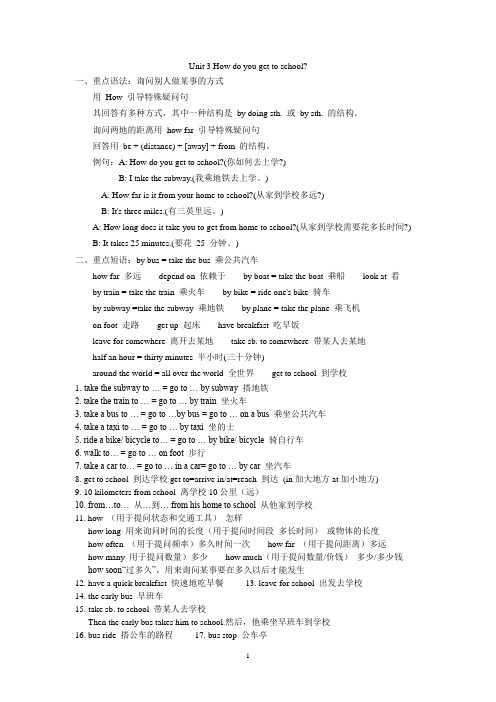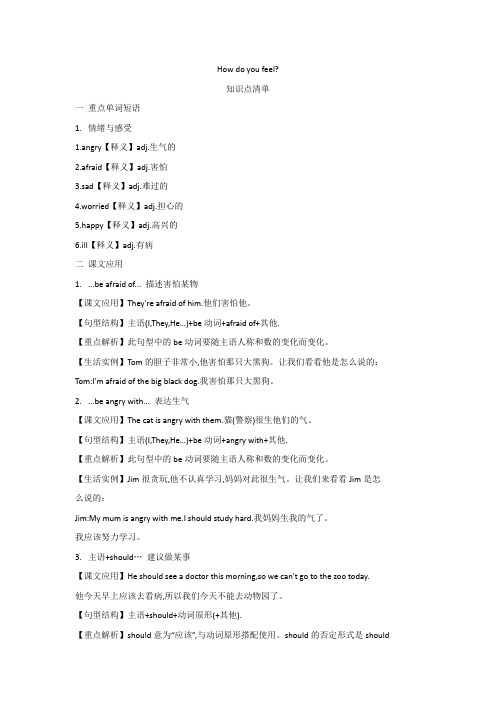与how有关的重点短语用法
初一(七年级)下册英语知识点:unit3-unit4

Unit 3 How do you get to school?一、重点语法:询问别人做某事的方式用How 引导特殊疑问句其回答有多种方式,其中一种结构是by doing sth. 或by sth. 的结构。
询问两地的距离用how far 引导特殊疑问句回答用be + (distance) + [away] + from 的结构。
例句:A: How do you get to school?(你如何去上学?)B: I take the subway.(我乘地铁去上学。
)A: How far is it from your home to school?(从家到学校多远?)B: It's three miles.(有三英里远。
)A: How long does it take you to get from home to school?(从家到学校需要花多长时间?) B: It takes 25 minutes.(要花25 分钟。
)二、重点短语:by bus = take the bus 乘公共汽车how far 多远depend on 依赖于by boat = take the boat 乘船look at 看by train = take the train 乘火车by bike = ride one's bike 骑车by subway =take the subway 乘地铁by plane = take the plane 乘飞机on foot 走路get up 起床have breakfast 吃早饭leave for somewhere 离开去某地take sb. to somewhere 带某人去某地half an hour = thirty minutes 半小时(三十分钟)around the world = all over the world 全世界get to school 到学校1.take the subway to … = go to … by subway 搭地铁2. take the train to … = go to … by train 坐火车3. take a bus to … = go to …by bus = go to … on a bus 乘坐公共汽车4. take a taxi to … = go to … by taxi 坐的士5. ride a bike/ bicycle to… = go to … by bike/ bicycle 骑自行车6. walk to… = go to … on foot 步行7. take a car to… = go to … in a car= go to … by car 坐汽车8. get to school 到达学校get to=arrive in/at=reach 到达(in加大地方at加小地方)9. 10 kilometers from school 离学校10公里(远)10. from…to… 从…到… from his home to school 从他家到学校11. how (用于提问状态和交通工具)怎样how long 用来询问时间的长度(用于提问时间段多长时间)或物体的长度how often (用于提问频率)多久时间一次how far (用于提问距离)多远how many 用于提问数量)多少how much(用于提问数量/价钱)多少/多少钱how soon“过多久”,用来询问某事要在多久以后才能发生12. have a quick breakfast 快速地吃早餐13. leave for school 出发去学校14. the early bus 早班车15.take sb. to school 带某人去学校Then the early bus takes him to school.然后,他乘坐早班车到学校16. bus ride 搭公车的路程17. bus stop 公车亭18. bus station 公车站bus stop 是指小站,bus station指大的站,比如汽车站。
what about和how about的用法(一)

what about和how about的用法(一)什么是”what about”和”how about”“what about”和”how about”是英语中常用的短语,用于提出建议、询问意见或探讨可能性。
它们在交流中常被用来询问对方是否同意或接受某个提议或建议。
下面将详细介绍这两个短语的常见用法。
“what about”的用法•用法1:提出建议–示例:What about going to the movies tonight?–解释:这句话表示提议去看电影,询问对方意见。
•用法2:询问信息–示例:What about the weather tomorrow?–解释:这句话表示询问明天的天气情况,请求对方提供信息。
•用法3:询问别人是否有关切–示例:What about your family? Are they doing well?–解释:这句话表示询问对方的家人状况,表示关心与询问。
•用法4:提出问题–示例:What about the red one or the blue one?–解释:这句话提出两个选择,询问对方的意见或选择。
“how about”的用法•用法1:提出建议–示例:How about trying a new restaurant tonight?–解释:这句话表示提议尝试一家新的餐馆,询问对方意见。
•用法2:询问对方愿意或准备好做某事–示例:How about going for a walk after dinner?–解释:这句话询问对方是否愿意或准备好在晚饭后散步,征求对方意见。
•用法3:询问对方是否同意或接受某个提议–示例:You can have the last piece of cake. Howabout that?–解释:这句话询问对方是否接受将最后一块蛋糕给他,征求对方意见。
•用法4:提出问题或提供选择–示例:How about going to the park or the beach?–解释:这句话提出两个选择,询问对方的意见或偏好。
what about how about区别和用法

what about how about区别和用法一、how about 被用来建议一个行动或不同的可能性,后面经常跟现在分词或代词 + 不带 to 不定式,有时也可以接名词或名词短语,例如:1、建议某人某事,例如:后面跟动名词:I’m free this evening. How about going out?今晚我有空。
出去怎么样?后面跟代词+ 不带 to 不定式,此时不能跟 what about 互换:How about we go for a movie?我们去看电影怎么样?后面跟名词或名词短语:How about a game of chess?下一盘棋怎么样?2、请求某人给你某物,此时不能跟 what about 互换,例如:Oh, you got some extra money?哦,你有多余的钱吗?3、询问某人是否要做某事,例如:How about buying me a drink?请我喝一杯怎么样?二、what about 通常用来暗示一个潜在的问题或是对象,具体点就是应该对某事做什么,后面通常跟一个名词或名词短语,此时不能与 how about 互换,例如:A: Let’s go on a trip!我们去旅行吧!B: But, what about my dance classes?但是,我的舞蹈课呢?三、how about 和 what about 在以下上下文中可以互换1、要求某人回应你所说的I work at the local hospital. How / What about you?我在当地医院工作。
那你呢?2、在询问是否有包含某人或是某物Jeanne, Rex, Leo, and Anna are going. How / What about Nate?珍妮、雷克斯、利奥和安娜要走了。
奈特呢?。
How_can_we_become_good_learners重点短语知识点讲解

How_can_we_become_good_learners重点短语知识点讲解Unit 1 How can we become good learners? 重点短语1.⼩组学习_____________2.制作单词卡⽚_____________3.听录⾳磁带________________4.向某⼈求助________________5.看录像________________6.同某⼈谈话________________7.太...⽽不能...________________8.作报告________________9.起初________________10.逐词逐句地________________11....的秘诀________________12.害怕做某事________________ 17.爱上...________________18.肢体语⾔________________19.也________________20.⼩菜⼀碟;很容易的事_______________21.查阅;查找________________22.以便;为了________________23.⼤声跟读________________24.记笔记________________25.句型________________26.英语⼝语________________27.在...⽅⾯犯错________________28.做某事的能⼒________________13.取决于;依靠________________14.注意;关注________________15.感到厌烦________________ 29.尽⼒做某事________________30.焦虑不安的________________31.害怕...________________16.每当;每次_______________32.把.和...连接起来________________重点句型:1.―越...越...‖的表达法: The more you read, the faster you’ll be.2.so...that..引导结果状语从句:The teacher spoke so quickly that I did not understand her most of the time.3.so that引导⽬的状语从句:I want to learn new words so that I can have a better understand of English movies.4.谈论做事⽅式:(1)—How do you learn English? —I learn by studying with a group.(2)—Do you learn English by reading aloud?Yes, I do. It helps my pronunciation.5.whether引导主语从句:But whether or not you can do this well depends on your learning habits.点拨提升:⼀.--------How do you learn English? —I learn by studying with a group.1.―by+doing形式‖表⽰⽅式、⽅法语法结构by+doing形式,―通过做...的⽅式‖I learn Chinese by listening to tapes。
Unit6Howdoyoufeel_(知识清单)人教PEP版英语六年级上册

How do you feel?知识点清单一重点单词短语1.情绪与感受1.angry【释义】adj.生气的2.afraid【释义】adj.害怕3.sad【释义】adj.难过的4.worried【释义】adj.担心的5.happy【释义】adj.高兴的6.ill【释义】adj.有病二课文应用1....be afraid of... 描述害怕某物【课文应用】They're afraid of him.他们害怕他。
【句型结构】主语(I,They,He…)+be动词+afraid of+其他.【重点解析】此句型中的be动词要随主语人称和数的变化而变化。
【生活实例】Tom的胆子非常小,他害怕那只大黑狗。
让我们看看他是怎么说的:Tom:I'm afraid of the big black dog.我害怕那只大黑狗。
2....be angry with... 表达生气【课文应用】The cat is angry with them.猫(警察)很生他们的气。
【句型结构】主语(I,They,He…)+be动词+angry with+其他.【重点解析】此句型中的be动词要随主语人称和数的变化而变化。
【生活实例】Jim很贪玩,他不认真学习,妈妈对此很生气。
让我们来看看Jim是怎么说的:Jim:My mum is angry with me.I should study hard.我妈妈生我的气了。
我应该努力学习。
3.主语+should…建议做某事【课文应用】He should see a doctor this morning,so we can't go to the zoo today.他今天早上应该去看病,所以我们今天不能去动物园了。
【句型结构】主语+should+动词原形(+其他).【重点解析】should意为“应该”,与动词原形搭配使用。
should的否定形式是shouldnot,should not可以缩写为shouldn't。
人教版六年级上册英语第一单元Unit1《How can I get there?》重要知识点总结

【精选】人教pep版六年级上册英语第一单元Unit1《How can I get there?》重要知识点总结Unit1 How can I get there?一、重点单词和短语Science科学museum博物馆post office邮局bookstore书店cinema电影院hospital医院tasty美味的,可口的London Eye伦敦眼stomach胃crossing十字路口turn left/turn right向左/右转go straight=walk straight直走next to紧挨着/与……相邻far from(离……远)near在……附近behind(在……后面)in front of(在……前面)between…and…(在…和…之间)二、重点句子1.How do you go to school? 你是怎样去上学的?2.where is the restaurant? 餐馆在哪里?3. Usually I go to school on foot. 我通常走路去上学。
4. Sometimes I go by bike. 有时候我骑自行车去。
5.问路之前,出于礼貌,我们要说“Excuse me”与后面的句子要用标点符号隔开。
6.Look at the traffic lights, remember the traffic rules. 看着交通灯,记住交通规则。
7.Stop at a red light.Wait at a yellow light. Go at a green light.红灯停。
黄灯等一等。
绿灯行。
8.Red means stop, yellow means wait, green means go. 红色的意思是停止,黄色的意思是等待,绿色的意思是通行。
9.How can I get to the park? 我该怎样到达公园呢?10.You can go by the No.15 bus. 你可以坐15路公交车去。
Unit 2-2020-2021学年八年级英语寒假提优(人教版)(解析版)
2020-2021学年【寒假提优—复习+预习】八年级英语Day 2 复习八上Unit 2 How often do you exercise?【重点语法】1. 频率副词: always, usually, often, sometimes, never频率副词在句中通常放在实义动词之前, be动词或助动词之后。
常用于一般现在时态中。
2.“次数”的表达方法一次once,两次twice,三次或三次以上:基数词+ times, 如:three times, five times,3. how often“多久一次”问频率,回答常含有频率词组或短语。
常见的how疑问词:1)How soon 多久(以后)2)how long “多久”3)How many+名复How much+不可名“多少”问数量(how much 还可问价格)【重点短语】1. go to the movies 去看电影2. look after = take care of 照顾3. surf the internet 上网4. healthy lifestyle 健康的生活方式5. go skate boarding 去划板6. keep healthy=stay healthy 保持健康7. eating habits 饮食习惯8. take more exercise 做更多的运动9. the same as 与什么相同10. be different from 不同11. once a month一月一次12. twice a week一周两次13.make a difference to 对......有影响/作用14. most of the students=most students15. shop=go shopping=do some shopping 购物16. be good for 对......有益17. be bad for 对......有害18. come home from school放学回家知识回顾19. of course = certainly = sure 当然20. get good grades 取得好成绩21. keep/be in good health 保持健康22. take a vacation 去度假3. take, spend, payIt takes sb. some time to do sth. 意为“花费某人……时间来做某事”。
人教部编版初中英语中考78个易混易错单词短语句型梳理
人教部编版初中英语中考78个易混易错单词短语句型梳理一、英语常用易混淆单词/词组的区别用法how much和how many的区别用法how much和how many的区别:how much用来询问事物的数量,后接不可数名词;how many用来询问事物的数量,后接可数名词复数。
1.所修饰词不同how much用来修饰不可数名词,表示数量,也可单独使用。
how many用来修饰可数名词的复数,它的句式是:How many+复数名词+一般疑问句+?例句:How much milk is there in the glass?玻璃杯里有多少牛奶?How many books are there on the desk?有多少本书在桌子上?2.用法不同How much 表示多少钱,用来问价格。
例句:How much is this dress?这个连衣裙多少钱?How many 表示多少,用来问数量。
例句:How many apples do you have?你有多少苹果?in和on的区别用法当我们表示某些东西被其他东西所包围时使用“in”这个词。
而“on”用于描述物体被放置在其他物体上方或外部的情况。
in可表时间,表地点,表手段、方法、材料。
on表示时间、地点、方位等。
1.意思不同in:prep.在 ... 里;在 ... 地方;在 ... 期间on:prep.在 ... 之上2.用法不同in:in着重一段时间的过程,常用于重复动作或延续动作。
in表示从现在时间算起推移到将来的一段时间之后,一般与将来时态连用。
例句:He is a layman in economics.他对经济学一窍不通。
on:表示“在物体的表面上”,只能用on的表达方式有on the next morning,on the following。
例句:The spider is walking on the ceiling.蜘蛛在天花板上爬行。
2022人教版七年级英语上册 Unit 7---8同步考点汇总
Unit7Section A①---how much is this T-shirt?---It’s seven d ollars.How much意为“多少”,通常是就“多少钱”进行提问。
如果询问某个物品的价格,常用How much is...?也可以说What’s the price of...?在回答这个问句时,若所询问的东西是不可数名词或可数名词的单数时,谓语动词用is;若所询问的东西是可数名词复数或不止一种东西时,谓语动词用are。
常用“It’s/They are+价格”这个句型。
例如:---How much is your sweater?---It’s 50 d ollars.---How much is the coat?---It’s fifty yuan.②Can I help you?这句话有两种含义:一是服务员或营业员主动询问顾客需要的常用语,意为:请问,你需要点什么?如果在饭店,服务员对你说这句话,则表示:您想吃点什么?如果在图书馆,图书管理员对你说这句话,则表示:您要借什么书?二是某人主动询问对方是否需要帮助的用语,意为:您需要帮忙吗?在说英语的国家里,商店中的售货员通常问顾客Can I help you?或May I help you?或What can I d o for you?而不说What do you want?顾客如需购物,则说Yes,pl eas.然后说出自己所需要的商品。
如果仅想逛商店,则回答No,thanks. I’m just l ooking around.或Just have a l ook.例如:---Can I help you?---Yes, pl ease. I’d like some oranges.---Can I help you?---Thank you very much. Could you help me take these books to the classroom?③Here you are.(1)当别人向你要东西或借东西,你把东西递给别人时常说Here you are. 意为“给你”。
Unit__1_How_can_we_become_good_learners重点短语句型解析
Unit 1 How can we become good learners?重点短语:1.by working with通过与某人一起学习2.make word cards制作单词卡片3.listen to tapes听录音磁带4.ask sb. for help向某人求助7. too... to ...太......而不能...... 8.finish doing sth完成做某事9.the secret to... ......的秘密10.be afraid to do sth害怕做某事、be afraid of doing sth害怕做某事11.fall in love with爱上...... 12.the secret to......的秘诀13. body language 肢体语言14.as well也15.a piece of cake小菜一碟;很容易的事16.look up 查阅;查找17.so that 以便;为了so... that 如此......以至于18.take notes记笔记19.spoken English英语口语20.make mistakes in在......方面犯错误21.the ability to do sth做某事的水平22.depend on 视.......而定;取决于;依靠;依赖23.pay attention to doing sth 注意;注重24.connect ... With...把......和......连接或联系起来25. be good at 在....方面擅长 be good for 对....有益be good with擅长和....相处26.even if即使,即使27.be born with 生而具有固定短语:1.be afraid to do sth / be afraid of doing sth /sth 害怕做某事 / 某事2. by doing sth 通过做某事3. finish doing sth 完成某事4. try to do sth.. 尽力做某事5. find it + adj. + to do sth 发现做某事find sb. doing sth发现某人正在做某事6. begin to do sth 开始做某事7. help sb. ( to ) do sth 协助某人做某事8. need to do sth 需要做某事9. keep doing sth 一直在做某事10. practice doing sth 联系做某事11. remember to do sth 记得去做某事 remember doing sth 记得以前做某事2.拓展:介词by的其他用法:1)by+交通工具,“乘/坐...” by bus2)by+地点,“在...的旁边;靠近...” by the la ke3)by+时间,“截止到...;不迟于...” by ten【by短语】by the way 顺便问一下by accident= by chance 偶然地by mistake 错误地one by one 一个接一个step by step 一步一步地by the time 到……为止by oneself 独自地by hand 用手….... 末尾by the end of 到He broke the window with a stone.Please answer the question in English.二..疑问词how的用法1)(问方式方法)怎样;如何①---_______ do you learn English well?---I learn it by using it in my daily life.②---Can you tell me_______I can get to the nearest post office?2) 身体怎么样?--How are you? ---Fine. Thanks.3) How +adj 构成的疑问词How often__________How old__________How far__________How soon__________How many__________How much__________How long__________How tall__________练习: 用How +adj 构成的疑问词填空1.--- __________will it take you from your school to the library?---About half an hour.2.---__________is Mr Wang? ---He is forty years old.3.--- __________ will you come back? ---In a week.4.--- __________people are there in your family? ---Four.5.--- __________milk do we need? ---Three bottles.6.--- __________do you go to see your grandma? ---Once a week.7.--- __________do you live from school? ---Three miles.三、.practice v 练习practice doing sth 练习做某事【拓展】finish doing sth ,enjoy doing sth , mind doing sth ,give in doing sth , can’t help doing sth①We often practice __________English among English.(speak)②This term I enjoy __________(watch) English movies.四.It’s too hard to understand spoken English.练习:①[2013·雅安] It is important ________ people ________ learn team spirit. A.of; of B.of; to C.for; to D.to; to②It’s foolish________him to do so. A. for B. of C. to D. with2.too...to...“太...而不能...”. Eg. He is too young to join the party.注意:not+反义词+enough to...so...that+否定句练习:我弟弟年龄太小不能上学。
